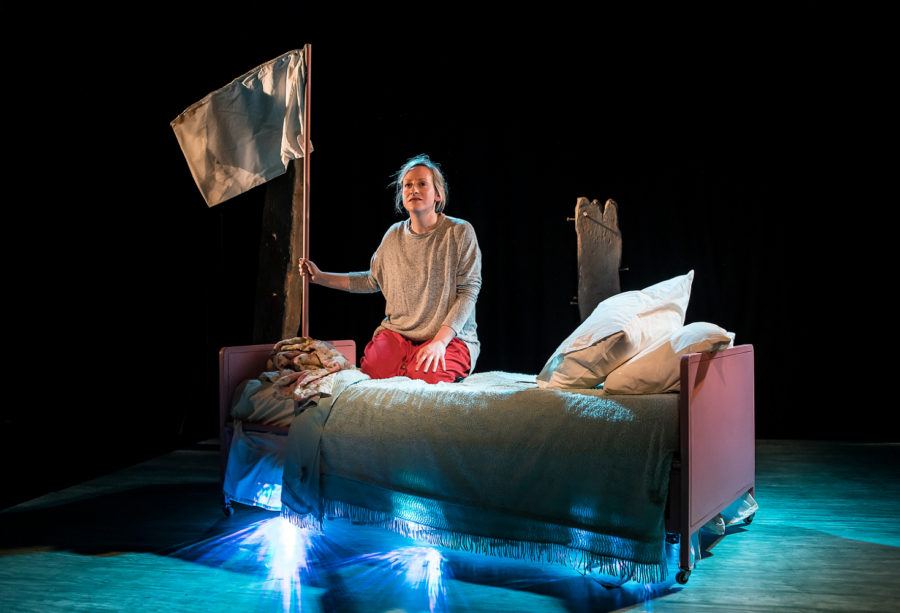Memory’s a funny thing. I lost my gran – who I lived on the next road to for most of my life, and still spoke to every week after I left home – about three years ago, and I’ve still got a very visceral, tangible sense of her. But that sense is a montage, a collage of experiences stretching over 35 years. The memory of what it felt like to hug her when I came up to barely past her waist is as immediate to me now as the memory of when I towered over her. As Jane Upton puts it in her one-woman show Finding Nana, our memories aren’t what we think – they’re memories of memories of memories of memories of something that may, way back, be the ‘real’ thing.
Finding Nana isn’t about my gran, obviously, but Upton’s deeply autobiographical evocation of her relationship with her nana, before and after her death, feels at times like it could have been. Partly I think that’s down to some of the shared reference points for someone my age – budget beach holidays in the late eighties and early nineties, whether in Llandudno or the Isle of Wight, were presumably just as gloriously average everywhere – but it’s also because of the simple, warm lyricism of Upton’s prose.
As delivered by Stacey Evans, Upton’s monologue captures a wide range of moods. As the play’s ‘Jane’, Evans oscillates between little girl, awkward teenager, anxious carer and grieving mourner. A somewhat over-committed rendition of ‘Agadoo’ notwithstanding, there’s no cringe-making adult-playing-a-child here; rather, Jane’s whole life is refracted through the nostalgic sadness of Jane now. Wearing her nana’s green swimming costume under a red dress and cardie, Evans carries all the layers of her life with her; she is still the child, the teenager, the carer, still desperately and immediately in love with her nana, still as lost and helpless as she ever was.
Her Jane is bold, funny and direct. In capturing the fancy-dress competitions (“I was the fattest, so I had to be Mario”), ballroom dancing, walks along the beach and ice lolly vendors of her youth, she has a guileless smile that delights in the memory, even while acknowledging its objective banality. Holidays were defined, even valued, by their regularity and predictability, the cycles of time that blur into one and which, in Jane’s adulthood, have been disrupted. Later, cyclical time reappears in Jane’s repeated visits to her gran’s house and her discovery of yet another disaster that has overtaken the ailing woman. Evans depiction of Jane’s gran is full of love, the scrunched-up face and creases of worry a caricature full of character. When she performs both sides of Nana telling Jane – who she no longer recognises – how marvellous her granddaughter is, my heart broke.
Evans carries the show, whether running around in the swimming costume, shepherding her invisible and terrified nana to a dining table in the care home, or inviting a strange man back to her hotel room because he shows her some kindness while she grieves. She is ably supported throughout by the combined set, lighting and sound design of Sara Perks, Alexandra Stafford and Arun Ghosh, all focused on a single bed. That bed is Nana’s, covered in pillows and blankets, but it becomes Jane’s life-raft – almost literally, as during a long sequence it turns into an Isle of Wight ferry that then itself becomes a metaphor for Jane’s grief, the voiceover of the captain advising passengers to “keep their eye on the horizon” when they get lost. The bed lights up with the shimmering of water at its base, and compartments contain the detritus of Nana’s life; objects Jane clings on to and desperately lists as she tries to keep Nana’s memory in her head.
The play’s move towards a final resolution, in which Nana will be remembered in a new way as Jane moves on is a little too pat, but is twisted from a conventional pattern by Nana finally appearing in a voiceover. Her accent twists from Derby to American, and Jane realises she is parroting half-remembered quotations from Richard Dawkins, various movie stars, and even Jane herself. Jane isn’t moving on from Nana, but from her own paralysing voices – and in the cathartic conclusion, she turns on a projector to play images of (presumably) Upton’s real nana, rejecting the fluid and untrustworthy memories of her own head for an external visualisation of the human being that prompted them. It’s a lovely tribute, brought powerfully to life.
Finding Nana is at Nottingham Playhouse until February 10th. For more details, including future tour dates, click here.


